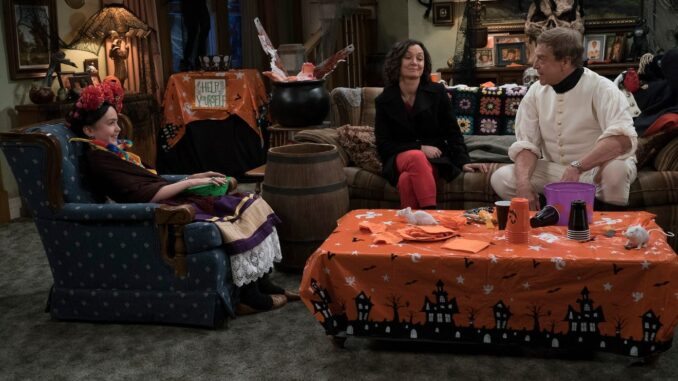
Navigating Political Correctness in “The Conners” Halloween Episode
The Halloween episode of The Conners, titled “There Won’t Be Blood,” highlights a theme that resonates deeply in today’s society: the balance between political correctness and free expression. As a continuation of the beloved Roseanne franchise, this episode cleverly weaves humor and social commentary, echoing the show’s long-standing tradition of tackling relevant issues head-on. Despite the absence of Roseanne herself, the spirit of the show remains intact, capturing the Conner family’s unapologetic approach to life.
A Tradition of Halloween Episodes
Since its inception, Roseanne has been known for its Halloween episodes, which have become an annual staple for fans. These episodes often blend humor, creativity, and a touch of spookiness, allowing the Conners to explore various social themes while celebrating the holiday. The latest installment continues this tradition, albeit with a modern twist that reflects the changing landscape of cultural sensitivities.
In a world increasingly aware of the implications of representation and expression, the episode takes a comedic yet critical look at the constraints placed on self-expression—particularly in the context of children’s Halloween costumes. The Conners’ interactions and debates provide a lens through which viewers can consider the complexities of political correctness.
The Costumes: Creativity Meets Controversy
The episode introduces a colorful array of costumes, showcasing the Conner family’s signature humor. Dan, dressed as Napoleon Blown-apart, and Jackie as a disemboweled cheerleader, highlight the show’s penchant for clever wordplay and visual gags. Darlene’s daughter, Harris, dons the costume “Lizzie Boredom,” while Roseanne’s granddaughter, Mary, becomes “Scary J. Blige.” These costumes exemplify the family’s love for Halloween and their ability to find joy in the absurd.
However, the episode quickly shifts from lighthearted fun to a more serious discussion about what is deemed acceptable in today’s society. Young Mark, initially excited to dress as a character from Fortnite, faces a harsh reality when the school prohibits his costume due to its association with violence. This sets the stage for a deeper exploration of the rules governing self-expression, particularly in an educational environment.
The Debate: Free Expression vs. Sensitivity
The central conflict in “There Won’t Be Blood” arises from the clash between Dan’s traditional views on freedom of expression and Darlene’s desire to be mindful of others. Dan represents a more old-school perspective, where costumes are meant to be fun and outrageous, while Darlene embodies the newer sensibilities that call for respect and consideration.
Darlene’s humorous quip about her family’s overarching “saddening” nature underscores the absurdity of the overly broad restrictions imposed by the school. “Does that mean we can’t go out anymore?” she asks, poking fun at the rigid rules that can sometimes stifle creativity. This moment serves as a comedic relief while simultaneously raising questions about the implications of such regulations.
Mark’s eventual decision to dress as Frida Kahlo represents a compromise between honoring the legacy of a great artist and navigating the complexities of cultural representation. His choice sparks pride in his mother and grandfather, demonstrating how personal expression can be both respectful and empowering. Yet, it also raises the question: how do we define the line between admiration and appropriation?
The Straw Man Principal
While the episode raises important issues, the portrayal of the school principal as a rigid enforcer of rules serves as a somewhat simplistic representation of the debate. This character acts as a straw man, allowing the Conners to voice their frustrations but lacking the depth that a more nuanced portrayal might have provided. The principal’s excessive rigidity, while relatable to some, detracts from the potential for a more profound exploration of the issues at hand.
The portrayal of such an extreme character often leads to a more comedic outcome but can diminish the weight of the underlying arguments. In reality, discussions about political correctness and cultural sensitivity are often multifaceted and deserving of a richer dialogue. The episode could have benefited from a more balanced representation of differing viewpoints, offering viewers a chance to engage with the complexities rather than merely laugh at a caricature.
A Shift in Cultural Landscape
The discussions within “There Won’t Be Blood” reflect a broader cultural shift regarding how we approach holidays and celebrations. As society becomes more aware of the implications of representation, the Conners’ Halloween episode serves as a microcosm of these changes. The characters navigate the tension between honoring traditions and adapting to a world that demands greater sensitivity.
In a time when many feel that political correctness has gone too far, The Conners embraces this conversation, showcasing the humorous yet frustrating reality of attempting to navigate modern sensibilities. By doing so, the show remains relevant, connecting with audiences who grapple with similar dilemmas in their own lives.
Conclusion: A Balancing Act
As The Conners continues to evolve, episodes like “There Won’t Be Blood” highlight the challenges of striking a balance between free expression and cultural sensitivity. The Conner family’s adventures provide a humorous and insightful commentary on contemporary issues, reminding viewers of the importance of dialogue and understanding.
While political correctness may be a source of contention for some, the episode ultimately illustrates that humor, creativity, and respect can coexist. It encourages audiences to reflect on their own beliefs about expression and to consider how they navigate the complexities of modern life. In the spirit of Halloween, the Conners remind us that while costumes may change, the essence of family, love, and laughter remains timeless.
